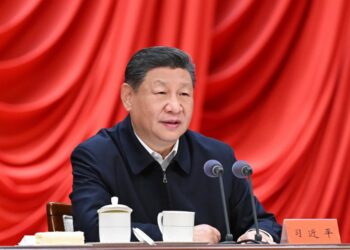Managers of Asia, Europe and Africa will meet in the port city of Tianjin, in northern China, from August 31 to September 1, on the occasion of the largest Shanghai cooperation organization (OCS) in history, in order to develop the master plan for the next decade of development of the block.
Originally created to respond to security concerns, the OCS has become, during its 24 years of development, a global regional organization representing almost half of the world’s population. Here is what you need to know about the remarkable course of the OCS, which you can expect at the Tianjin summit.
Aerial photo taken by a drone showing a light show along the Haihe river in Tianjin, in northern China, August 25, 2025. (Photo: Penghui)
A regional block in evolution
The OCS finds its origins in the “Shanghai Five” mechanism when China, Russia, Kazakhstan, Kyrgyzistan and Tajikistan met in 1996 to manage border security issues after the end of the Cold War. On June 15, 2001, the Shanghai cooperation organization was created, with Uzbekistan as sixth member.
What was initially a regional security group became a regional organization bringing together almost half of the world’s population, a quarter of the world’s land area and a quarter of world GDP. With the membership of India, Pakistan, Iran and Bélarus, the OCS now has ten member states, as well as two observer states and 14 dialogue partners.
Dedicated to maintain regional security and the promotion of common development, the OCS adheres to the spirit of Shanghai, which is characterized by mutual trust, mutual interest, equality, consultation, respect for different civilizations and the search for common development.
It is the spirit that guided the block in the development of a regional cooperation route, transcending ideological differences, social system and development paths, and showing the example of a new type of international relations.
Over the years, OCS member states have seen their mutual political confidence and their fruitful cooperation deepening, which has led to regional stability, regular commercial growth, common infrastructure projects and coordinated action in fields such as food and energy security.
In addition, thanks to mechanisms such as the regional anti -terrorist structure, the members of the OCS have effectively worked to maintain regional peace and stability by fighting terrorism, separatism and extremism. The security executives have been strengthened and joint exercises extended to cyberspace.
During the first 20 years which followed its creation, the total value of trade in OCS member states was multiplied by almost 100, while their share in world trade increased from 5.4% in 2001 to 17.5% in 2020, data which testify to their growing influence, according to a report on the development of trade published in 2022.
“Shanghai’s spirit is ‘root’ and ‘the soul’ of the ocs,” said Fan Xianrong, head of coordination within the OCS at the Chinese Ministry of Foreign Affairs.
Faced with an international landscape constantly evolving, the OCS member states will continue to defend this spirit through concrete actions, by proposing their solutions to create a fair and equitable global governance system, and by supporting the construction of a community of the common future for humanity, according to Mr. Fan.
China: a fervent defenser from Shanghai’s mind
As a founding member, China has always made the OCS a diplomatic priority and has firmly defended the spirit of Shanghai. The country has presented a series of important initiatives and proposals, and brought Wisdom, solutions and Chinese dynamism to regional development.
China has proposed to set up a shared future community of the OCS, an inspiring vision that enriches the spirit of Shanghai. She also called on the members of the OCS to build a common house characterized by solidarity and mutual trust, peace and tranquility, prosperity and development, good neighborhood and friendship, as well as equity and justice.
On the economic level, trade and investment links between China and other OCS members have become more and more solid, and cooperation is now extending to various sectors such as infrastructure, energy, agriculture and technology, thus improving the well-being of populations throughout the region.
In 2024, trade in China with other OCS members, observing states and dialogue partners reached a historic level of $ 890 billion, or 14.4% of the country’s total foreign trade. The same year, the number of Chine-Europe goods trains crossing the OCS countries and regions reached 19,000, an increase of 10.7% compared to 2023.
As part of its most recent efforts to promote technological cooperation, China has invited all parts of the OCS to use its Beidou navigation system and to participate in the development of the International Lunar Research Station, while undertaking to offer at least 1,000 training courses on digital technologies to other OCS countries over the next three years.
Since she took the presidency of the OCS in July 2024, China worked closely with all the parties and organized more than 100 events on the theme “Year of sustainable development of the OCS”, in particular ministerial meetings, a forum of OCS political parties, a summit of the media and reflection groups as well as an art festival.
“China will work with all the parts of the OCS in order to remain faithful to the initial aspiration of the organization, to assume its mission, to promote Shanghai’s spirit and provide solutions from the OCS for global governance and reform,” Foreign Affairs Liu Bin told the press last week.
What to expect from the Tianjin summit
With the planned participation of leaders in more than 20 countries and heads of ten international organizations, the next OC 2025 Summit should make it possible to identify a consensus and direct the organization towards the construction of a narrower shared future community.
According to Mr. Liu, the main results will include the signing of a declaration by the leaders of the OCS member states at the summit, as well as the approval of a block development strategy for the next ten years.
The summit will also publish declarations marking the 80th anniversary of the victory of the anti -fascist world war and the 80th anniversary of the United Nations Foundation, and will adopt a series of summary documents on the strengthening of cooperation in terms of security, economy, interpersonal and culture exchanges.
China will also present its new vision and its proposals for the OCS in order to perpetuate the spirit of Shanghai, to assume the mission of the time and to meet the expectations of the populations. It will also announce new measures and initiatives aimed at supporting the High Quality Development of the OCS and global cooperation.
“China believes that a friendly, united and productive Tianjin summit will allow the OCS to enter a new high -quality development phase, characterized by greater solidarity, narrower coordination, stronger dynamics and increased efficiency,” said Liu.
Sheradil Baktygulov, director of the Kyrgyzstan World Policy Institute, expressed great expectations for the summit. “The Summit of the OCS in Tianjin will take place in a difficult period marked by global turbulence, but it will become a brilliant star that will guide participants to the right track to follow for a safe and stable development.”








